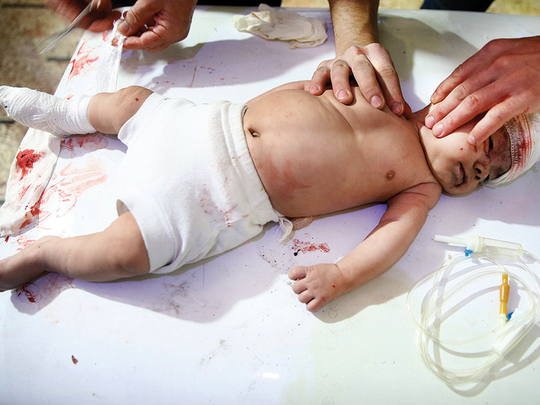
Douma: Entire families have been buried under the rubble in a rebel-held enclave near Syria’s capital, as government forces pursue a nearly week-long campaign against the area despite a de-escalation deal.
The escalation in violence aims to weaken rebels’ bargaining power ahead of string of diplomatic summits aimed at ending the six-year conflict.
The three countries agreed earlier this year to establish de-escalation or “safe zones” aimed at reducing hostilities in four battleground areas across Syria.
One such zone came into effect in Eastern Ghouta in July, but after months of relative calm, intense artillery fire and air strikes have pummelled the region for the past week.
Residents of the opposition stronghold have described living in utter terror.
“We’re forced to hide in parts of our home that aren’t suitable for living, like the bathroom and the kitchen,” said 28-year-old Majed.
“We even sleep there sometimes.”
The father of two lives in Douma, one of the largest towns in Eastern Ghouta and a regular target of regime raids.
Despite his wife’s efforts to create a normal life for their children, their four-year-old son has been left deeply scarred.
“When he hears the bombing, he runs to hide in the closet or behind the door, screaming, ‘The plane, the plane is attacking’,” Majed told AFP.
Since Sunday, government bombardment of Eastern Ghouta has killed more than 100 civilians including 14 children, and wounded hundreds more, according to the Britain-based Syrian Observatory for Human Rights.
In Douma on Sunday, an AFP journalist witnessed doctors rushing to treat wailing children lying on bloodstained hospital beds.
Their eyes wide with fear, children awaited life-saving care, many having had limbs pierced by shrapnel.
Nearby, two men mourned over the lifeless body of a child, wrapped in a red-and-white sheet on the floor.
An estimated 400,000 people live in Eastern Ghouta, where a four-year government siege has made food, medicine, and other basic necessities either unavailable or too expensive.
In the rebel-held town of Madira on Sunday, volunteers from the White Helmets rescue force climbed through the rubble of a building after a recent air strike.
Flashlights in hand, they scrambled over concrete blocks and metal rods to try to find the bodies of the family that had been living there.
“They’re six people. We found three, and three are left,” one volunteer said.
One volunteer dug into the rubble with a wooden stick and uncovered a limb, which he placed carefully in a white bag.
“It’s a child’s leg,” his colleague said.
Another volunteer said the air strike had hit “a bomb shelter that residents were hiding in since the evening call to prayer”.
“There are a lot of body parts,” he added.
According to the Observatory, the six-member family - a man, his wife, and their four children - all died in the bombardment.
After regime shelling on Douma earlier that week, paramedic Firas Al Kahhal said he had witnessed a haunting scene.
The 22-year-old was dispatched to the bombed-out home to search for any survivors.
“As soon as we entered I saw a baby girl, no more than eight months old, trying to crawl out of the rubble,” Kahhal told AFP.
The infant had suffered wounds to her head, but survived.
“What we saw was heartbreaking. She lived under shelling and terror. Her brain can’t even absorb what’s happening.”












